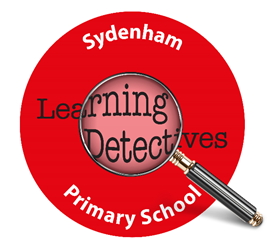

 Rights Links: Article 12 – Respect for the views of the Child; article 15 – Freedom of Association; Article 29 – Goals of Education
Rights Links: Article 12 – Respect for the views of the Child; article 15 – Freedom of Association; Article 29 – Goals of Education
At Sydenham Primary School we believe in the power and importance of student voice. The aim of our Learning Detectives is to give children a say on learning that takes place within the classroom. Students then give the teachers confidential feedback that they can use to improve the learning experience of their classes.
Using the Learning Detectives Proforma our designated Learning Detectives observe lessons and give teachers confidential feedback that they can use to improve students' learning experiences.
What is a Learning Detective?
Our Learning Detectives help the school’s Senior Leadership Team to monitor the learning behaviours of the children at Sydenham Primary School.
How do you become a Learning Detective?
You can write a letter of application to Mrs Westwood, explaining why you would like to be a Learning Detective, and what skills you have that will help you to do this important job.
Is there any training for Learning Detectives?
Our Learning Detectives receive a day’s training to look at how children learn best, and what to look for in a lesson. The training focuses on looking for effective learning.
How do the Learning Detectives gather evidence?
Our very first Learning Detectives designed their own evidence gathering form. We set protocols for what the Learning Detectives should do before, during and after evidence-gathering sessions.
When do the Learning Detectives do their monitoring?
They observe lessons in pairs, for approximately 10 minutes, with a member of the Senior Leadership Team (SLT). Their evidence-gathering sheets track the observed children’s learning behaviours. The Learning Detectives look for positive learning behaviours. Following the lesson, the two Learning Detectives have time to discuss their findings with a member of the SLT.
What happens next?
The Learning Detectives give verbal feedback to the children in the classrooms where they have observed. Sometimes, their evidence is shared at staff meetings or emailed to all teachers.
Is their evidence shared with anyone else?
Sometimes, the findings are shared with the school’s governors and with parents and carers on the school newsletter or website. Also, the Learning Detectives occasionally lead whole school assemblies.
What is the impact of the Learning Detectives (What difference have they made)?
There is significant impact of the work of the Learning Detectives at several different levels……...
Firstly, the teaching staff have heard the feedback from the pupils and have made changes to the way they teach children (their pedagogy) because they have listened to the children saying what helps them to learn.
Secondly, the other pupils in our school, who hear the feedback at the end of the evidence-gathering lessons, have a deeper understanding of learning, and a greater sense of responsibility for their own learning (as well as supporting others’ learning!).
Thirdly, the Learning Detectives themselves understand and are able to unpick learning. They are able to discuss their understanding of themselves as learners, and the personal skills they have developed as Learning Detectives. They appreciate the leadership opportunity and responsibility.
Guiding Principles:
We have two principles we must always follow:
1. We only look at learning and learners, not teaching.
2. We focus on positive examples of great learning.
Learning Detectives’ Rules for Gathering Evidence in Lessons:
Before the lesson:
1. Be prepared; make sure you have pens, pencils, logbooks, Learning Detective identity badge, sash etc.
2. Check with the teacher that they know you are coming, introduce yourself (the day before) and ask for 5 minutes at the end to give feedback to the class.
3. Inform your class teacher that you will be missing some of your own lesson, and ask her about catching up on the work you will miss.
4. Make sure you look smart (correct and smart uniform).
5. Arrive in good time, a couple of minutes before start of lesson.
During the lesson:
6. Go in with an open mind, don’t be biased.
7. Always record positive evidence … never write down negatives.
8. Be polite to everyone in the lesson and treat everyone in the room with respect.
9. Don’t draw attention to yourself and do not interrupt the learning in any way.
10. Pay close attention to the children and their learning … don’t get side-tracked by the lesson or the teacher!
11. Remember that you are there as an observer, and try to sit where you can see the learners’ faces.
12. Remind the teacher that you need to talk to the children and then give clear and helpful feedback.
After the lesson:
13. Thank the teacher for having you in the lesson.
14. Enter and leave the room with a smile.
15. Write a thank you letter to the teacher.